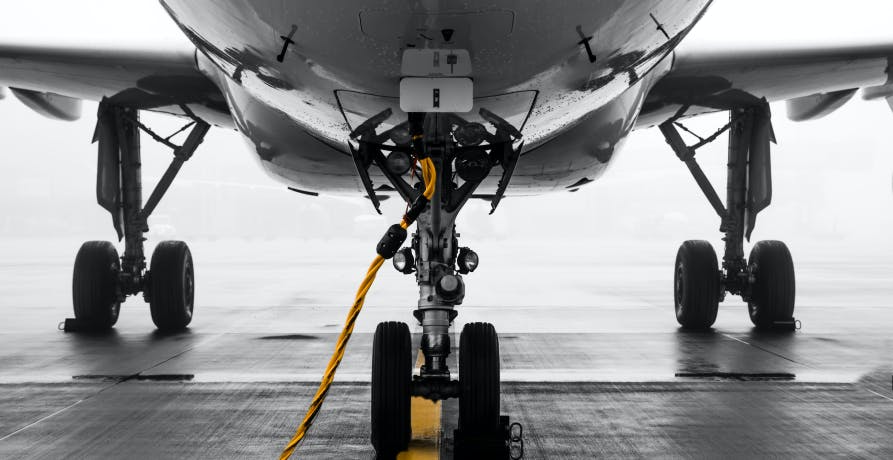ESG / CSR
Industries
Can business travel become sustainable?



Business travel is still an important part of the corporate world. Despite the rise of online meetings and conferences, many businesses still have the need for face-to-face networking and events. Unfortunately, business travel often comes with a corresponding environmental cost and is a significant contributor to global carbon emissions.
👉 In this article we’ll explore the environmental cost of business travel and how it can become more sustainable.
Business travel
Business travel is quite simply travel for business purposes, whether it involves taking a cab downtown to meet a client or flying halfway across the world to attend a conference, it plays a pivotal role in fostering relationships, expanding market reach, and exploring new markets.
💡 In 2021, 20% of global travel and tourism expenditure came from business travel.
There's an undeniable value in face-to-face interactions. It solidifies deals, allows for exploration of new markets, and deepens understanding in ways that digital communication often can't. Additionally, attending industry events not only keeps professionals updated but also offers invaluable networking opportunities.
However, there's a flip side. With every flight taken or mile driven, there's an environmental impact. In today's eco-aware world, the carbon footprint of frequent business travel is becoming hard to ignore.

Business travel in 2023
Importance of business travel to industries and the global economy
Business travel remains a crucial component of international trade and commerce. It enhances direct human interactions, builds trust, facilitates deal-making, and promotes the sharing of expertise. Moreover, it creates avenues for businesses to tap into new markets, thereby boosting global interconnectivity and broadening economic horizons. Its continued importance is evident in the benefits it brings to markets such as the hotel industry, airline sector, and tourism, thereby playing a pivotal role in the global financial ecosystem.
Business Travel Trends
The business travel sector is undergoing significant changes, driven by environmental concerns, technological advancements, and global events:
- Digital transition - With the rise of digital communication tools, there’s been a notable shift towards virtual meetings. Estimates suggest that nearly 18% of business travel might be replaced by virtual interactions. This not only offers financial benefits for companies but also reduces carbon emissions.
- Post-COVID dynamics - The aftermath of the COVID-19 pandemic witnessed a sharp decline in business travel. Although initial expectations were that business travel would quickly return to 2019 levels, recent analyses predict that by the end of the year, corporate travel budgets might only reach 71% of pre-pandemic levels. This shortfall in the sector can be attributed to economic pressures.
- Environmental impact - The environmental footprint of business travel, especially carbon emissions from flights and waste from hotel stays, has become a major concern. However, the industry is evolving with increasing efforts to mitigate its environmental effects.
What makes business travel unsustainable?
Air travel
One of the primary contributors to the unsustainability of travel is air travel - in fact, flights account for about 90% of business travel emissions.
The problem is not just the sheer volume of flights but also the type of fuel used. Jet fuel consumption results in significant carbon emissions, contributing to the global carbon footprint. These emissions play a direct role in global warming, intensifying the greenhouse effect and hastening climate change. The aviation industry, despite technological advancements, is yet to find a sustainable alternative to traditional fuels, making air travel a significant environmental concern.
👉 To learn why it’s so difficult to decarbonise the aviation industry head over to our article.
What’s more is that business travelers frequently opt for business class tickets due to the enhanced amenities, comfort, and convenience they offer. However, this choice carries an environmental cost. Business class cabins, with their spacious seats and added luxuries, accommodate fewer passengers than economy class for the same amount of space. As a result, when flying business class, a passenger's carbon footprint is proportionally larger since the same amount of fuel is being used to transport fewer individuals. In simpler terms, the emissions per business class passenger are significantly higher compared to those in economy and some studies suggest that flying business class can emit up to three times more carbon than flying economy
💡 Business travelers account for 12% of airline passengers, but account for as much as 75% of airline profits!
Other environmental impacts
Business travel's environmental impact extends beyond just the emissions from flights. The various aspects of a business trip, from accommodation to daily activities, lead to increased consumption and waste. Let’s take a closer look:
- Hotel stays - Hotels are significant consumers of energy and water. Daily cleaning means fresh linens and towels, which increases water and energy consumption. Additionally, many hotels are equipped with amenities like swimming pools, gyms, and restaurants, which also contribute to high energy and water usage.
- Food and dining - Business travelers often eat out, leading to an increase in food waste - dining in hotels or upscale restaurants can lead to higher resource consumption compared to local eateries or home-cooked meals.
- Transport - Apart from air travel, ground transportation like taxis, car rentals, and even public transport contributes to environmental harm. While public transport is generally more eco-friendly, business travelers often prefer the convenience of taxis or rented cars, which have a higher carbon footprint per person.
- Resources - Business meetings, conferences, and events often involve printed materials, promotional items, and other resources that might end up as waste. Even digital devices, which reduce the need for printed materials, come with their own environmental impact in terms of energy consumption and electronic waste.
- Overconsumption of amenities - Hotels often provide guests with disposable items like mini toiletries, which contribute to plastic waste. Additionally, complimentary services like minibars, room service, and other hotel facilities can lead to overconsumption.
- Infrastructure development - The demand for business-oriented facilities like convention centers, luxury hotels, and airports can lead to land degradation, habitat destruction, and increased resource consumption during construction and operation.
- Increased energy consumption - Business centers, conference rooms, and other facilities often require sophisticated lighting, heating, cooling, and electronic setups, leading to higher energy consumption.

How can business travel become more sustainable?
As businesses around the world begin to recognize the environmental impact of their employees' business travel, many are taking steps to reduce their carbon footprint and make their travel habits more sustainable. In fact, in recent years increasing numbers of large companies have pledged to reduce their corporate travel emissions.
So how can your company evolve towards greater sustainability?
- Virtual Meetings - With advancements in technology, many meetings can be held virtually, eliminating the need for travel altogether. Platforms like Zoom, Microsoft Teams, and Skype offer high-quality video conferencing, allowing for productive meetings without the associated travel emissions.
- Opt for eco-friendly accommodation - Choose hotels and accommodations that are committed to sustainability. This could mean hotels that use renewable energy, have water-saving measures in place, or even those that source local, organic food for their restaurants.
- Reduce and offset carbon emissions - If flying is unavoidable, consider offsetting the carbon emissions from the flight. Many airlines now offer carbon offset programs, where travelers can invest in environmental projects to compensate for the emissions from their journey. 👉 To learn more about carbon offsets why not check out our article on the topic.
- Use public transport - Whenever possible, opt for public transportation over taxis or rental cars. Not only is this often more cost-effective, but trains, buses, and trams generally have a lower carbon footprint per passenger than individual vehicles. 👉 To discover why trains are usually much more environmentally friendly head over to our article.
- Promote train travel - For shorter distances, encourage employees to take trains instead of planes. Trains, especially electric ones, often have a much lower carbon footprint than flights.
- Limit use of hotel amenities - Encourage employees to decline daily room cleaning, avoid using single-use plastics provided in rooms, and make use of recycling facilities if available.
- Digital over physical - Reduce the use of physical promotional materials and documentation during business events and meetings. Use digital alternatives whenever feasible.
- Support local - When dining or purchasing goods, support local businesses and choose locally sourced products wherever possible. This not only reduces the carbon footprint associated with transporting goods long distances but also supports local economies.
- Educate and train employees - Provide training to employees on sustainable travel practices. This could include packing light to reduce fuel consumption, choosing direct flights, or even tips on how to select sustainable accommodation.
- Regularly review travel policies - Businesses should periodically review and update their travel policies to incorporate the latest best practices in sustainable travel.
- Purchase economy or economy plus air tickets - Flying in business class is as much as three times more damaging for the environment than flying in economy. This is why, wherever possible, employees should opt for economy or economy plus.
By incorporating these strategies and fostering a culture of sustainability, businesses can significantly reduce the environmental impact of their travel practices while still achieving their corporate objectives.
What about Greenly?
At Greenly we can help you to assess your company’s carbon footprint, and then give you the tools you need to cut down on emissions. Why not request a free demo with one of our experts - no obligation or commitment required.
If reading this article has inspired you to consider your company’s own carbon footprint, Greenly can help. Learn more about Greenly’s carbon management platform here.




